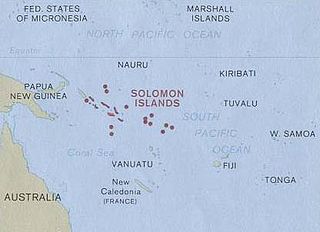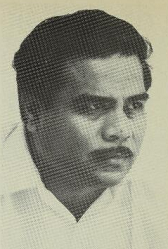Related Research Articles

Solomon Islands is a sovereign state in the Melanesia subregion of Oceania in the western Pacific Ocean. This page is about the history of the nation state rather than the broader geographical area of the Solomon Islands archipelago, which covers both Solomon Islands and Bougainville Island, a province of Papua New Guinea. For the history of the archipelago not covered here refer to the former administration of the British Solomon Islands Protectorate, the North Solomon Islands and the History of Bougainville.

Politics of Solomon Islands takes place within the framework of a parliamentary representative democratic, constitutional monarchy. Solomon Islands is an independent Commonwealth realm, where executive power is exercised by the government. Legislative power is vested in both the government and a multi-party parliament.

Solomon Islands is a sovereign state consisting of six major islands and over 900 smaller islands in Oceania lying to the east of Papua New Guinea and northwest of Vanuatu and covering a land area of 28,400 square kilometres (11,000 sq mi). The country has a population of 652,858 and its capital, Honiara, is located on the island of Guadalcanal. The country takes its name from the Solomon Islands archipelago, which is a collection of Melanesian islands that also includes the North Solomon Islands, but excludes outlying islands, such as Rennell and Bellona, and the Santa Cruz Islands.

Sir Peter Kenilorea KBE was a Solomon Islander politician, officially styled The Rt Hon. Sir Peter Kenilorea as a member of the Privy Council of the United Kingdom. He was the first Prime Minister of an independent Solomon Islands, from 1978-81, and also served a second term from 1984-86.
Bartholomew (Bart) Ulufa'alu was the fifth Prime Minister of the Solomon Islands from 27 August 1997 to 30 June 2000.

Fred Iro Fono was a Solomon Islands politician, serving as the country's Deputy Prime Minister and Minister for Rural Development and Indigenous Affairs from December 2007 to August 2010. He was a member of the People's Alliance Party and represented Central Kwara'ae Constituency in the National Parliament for thirteen years from 1997 to 2010, when he was defeated for re-election by MP Jackson Fiulaua.
Edward Huni'ehu was a Solomon Islands politician.
Nelson Ne'e was a Solomon Islands politician.

The Solomon Islands United Party (SIUP) is a political party in the Solomon Islands.

The 9th Parliament of Solomon Islands, determined by the 2010 general election, was the National Parliament of Solomon Islands from 2010 until 2014. It was preceded by the eighth and followed by the tenth.
Andrew Nori was a Solomon Islands lawyer and politician, arguably best known for his role in the ethnic conflict on Guadalcanal in the late 1990s and early 2000s.

General elections were held in the Solomon Islands on 22 June 1976. Although contested by three political parties, the Independent Group emerged as the largest group in the Legislative Assembly, and elected Peter Kenilorea Chief Minister.

General elections were held in the Solomon Islands on 6 August 1980. They were the first since independence has been achieved two years earlier. The Solomon Islands United Party led by Prime Minister Peter Kenilorea emerged as the largest party, winning 16 of the 38 seats. Following the elections, Kenilorea was re-elected Prime Minister.
Charles Dausabea was a Solomon Islands politician.

General elections were held in the Solomon Islands between 22 May and 12 June 1973. The following year, Solomon Mamaloni of the People's Progressive Party became the first Chief Minister.
'Are'are was a single-member constituency of the Governing Council and Legislative Assembly of the Solomon Islands. Created in 1973 when the Governing Council was expanded from 17 to 24 seats, it was located on the island of Malaita. In the 1973 elections the seat was won by David Kausimae, who had been elected in the South Central Malaita constituency in the 1970 elections, defeating Peter Kenilorea. It was abolished in 1976 and succeeded by East 'Are'are and West 'Are'are.
Francis Bugotu was a Solomon Islands public servant, diplomat, and educationist. He served two terms as the country's permanent representative to the United Nations, and was also secretary-general of the South Pacific Commission from 1982 to 1986.
Peter Kenilorea Jr. is a Solomon Islander politician. He is the son of Peter Kenilorea, and was elected to the National Parliament of Solomon Islands in 2019.
Bwebwetake Areieta was an I-Kiribati politician. He served as a member of the Legislative Council and House of Assembly from 1971 until his death, also holding the posts of Member for Social Services and Minister of Communications, Works and Utilities during the 1970s.

Naboua T. Ratieta was an I-Kiribati politician who became the first Chief Minister of the Gilbert and Ellice Islands in 1974. The Ellice Islands separated from the colony the following year, and he remained Chief Minister of the Gilbert Islands until 1978. He also served as an MP from 1968 until his death.
References
- 1 2 3 Transitions Pacific Islands Monthly, August 1986, p50
- ↑ Kenilorea back with new ministry Pacific Islands Monthly, October 1980, p5
- ↑ Keesing's Record of World Events, Volume 34